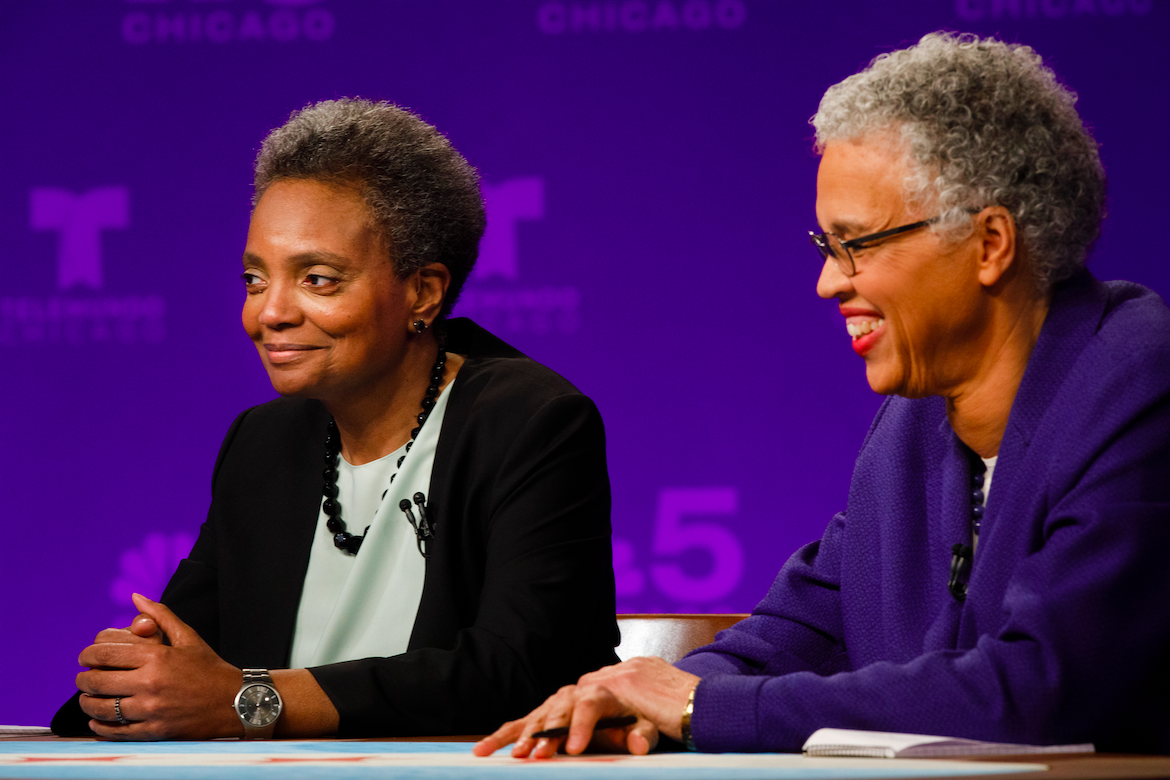For 32 years, ever since Harold Washington died, black politicians in Chicago have striven to put another one of their own in the mayor’s office. It was assumed the way to win in Chicago was to unite the community behind a single candidate, as this map shows Washington did:
Next up for visualization is the 1983 Democratic mayoral primary in Chicago — incumbent Jane Byrne facing challengers Harold Washington and Richard Daley. This map is of Harold Washington's support by precinct. More will follow Monday. pic.twitter.com/cASIKVzqRS
— Chicago Elections Project (@ChiElections) March 3, 2019
Some candidates even ran under the banner of the Harold Washington Party. When Carol Moseley Braun took a run at mayor in 2011, her slogan was “From Harold to Carol.” U.S. Rep. Danny Davis cut an ad for the campaign telling listeners that “any man who will not support his own house is worse than any infidel.”
But all those efforts failed. Moseley Braun won a single precinct, in the Minnie Riperton Apartments.
Come May, we're finally going to have another black mayor — but Chicago's tradition of electoral racial solidarity doesn't appear to be the reason.
Lori Lightfoot and Toni Preckwinkle are in the runoff because their campaigns transcended ethnic boundaries, something no other candidates in this race were able to achieve. Jeremiah Joyce and Bill Daley, the two Irishmen, won only majority-white wards. Susana Mendoza and Gery Chico won majority-Latinx wards. Neither Preckwinkle nor Lightfoot took the black vote. That was Willie Wilson, who won most of the wards on the South and West sides.
Lightfoot’s strongest appeal was among white progressive North Siders. In most of those wards, Preckwinkle ran close behind her. While their opponents were playing a century-old game of assuming voters would cast ballots along ethnic lines, Lightfoot and Preckwinkle blew that paradigm to pieces. They won because they did the best job of articulating the progressive agenda that at least a plurality of Chicagoans want. And in doing so, they may have changed Chicago politics permanently.
We can say now that the racially polarized mayoral election of 1983, Harold Washington’s first victory, in which ethnic voting patterns reached their peak, is no longer a reflection of modern-day Chicago. A city in which 49 percent of the electorate voted for a white Republican, for no other reason than to prevent the election of a black mayor, is not the Chicago of today.
But we can also say that Lightfoot and Preckwinkle's victories have their roots in that election. Washington, contrary to white voters' fears that he would turn Chicago into another Detroit or Cleveland, ran a fair, competent administration. He inspired a succession of black politicians — Carol Moseley Braun, Barack Obama, Kwame Raoul — who have made Illinois the state with the most black statewide electoral victories. More than in any other demographically similar city, white voters in Chicago are used to electing black candidates.
Preckwinkle honed her multiracial appeal as the alderman for Hyde Park, the same community of white independents and middle-class black voters that produced Obama, Moseley Braun, and Raoul. On the City Council, Preckwinkle built an independent record that appealed to North Side progressives — say, voting against Mayor Richard M. Daley's sale of the parking meter concession.
During her run for Cook County Board President in 2010, Preckwinkle told me she'd “decided we were going to run a campaign that was countywide and not parochial, provincial, ethnic-based, geographic-based,” appearing in both majority-black neighborhoods and majority-white suburbs. As for whether Obama had prepared white voters for a black candidate, she said, “I think I surely benefited from the fact that many of these voters had voted for an African-American for president, but we had to make our case ourselves.”
Later, Preckwinkle announced her candidacy for mayor in front of a mostly black crowd at the Lake Shore Hotel, emphasizing issues important to that community. She criticized school closings, promised to invest in distressed neighborhoods, and declared that she wouldn't tolerate police misconduct.
Lightfoot is also a transplant to Chicago. She grew up in Massillon, Ohio, and arrived here in 1986 to attend law school at U of C. She now lives in Logan Square.
With no experience representing Chicago's black community, Lightfoot couldn’t count on its vote. So instead, she ran as the reform candidate. Nearly all of her victories were in majority-white wards. While her opponents — a field of experienced Chicago politicians — were trying to gin up their ethnic bases, Lightfoot was roving all over the city, running an ideological, issues-based campaign focused on ending corruption and police misconduct.
The Sunday before the election, Lightfoot was at Cards Against Humanity's Bucktown headquarters, accepting endorsements from Ald. Scott Waguespack, former county clerk David Orr, and U.S. Rep. Robin Kelly.
Meanwhile, Susana Mendoza spent Monday at Los Comales restaurant in Little Village, accepting the endorsement of Marty Castro, former chairman of the U.S. Commission on Civil Rights.
Earlier in the race, Bill Daley famously skipped a televised debate to accept the endorsement of Plumbers Union Local 130. That would be the group run by James F. Coyne, who is also chairman of this year’s Downtown St. Patrick’s Day Parade.
Finally — and maybe I just noticed this because I wrote a book about Midwestern dialect — Preckwinkle, Lightfoot, and Amara Enyia, who grew up the daughter of Nigerian immigrants in the south suburbs, were the only candidates without strong regional accents. Who knows? That may have helped them appeal to independent North Side voters, who associate the Chicago accent with hack Machine politicians from Bridgeport and Beverly.
Whatever the reasons for a Preckwinkle-Lightfoot runoff, its candidates — who in 1983 would have suffered more prejudice than any of their opponents — signal a departure from Chicago's longstanding tradition of tribal voting. That feels worth celebrating.



